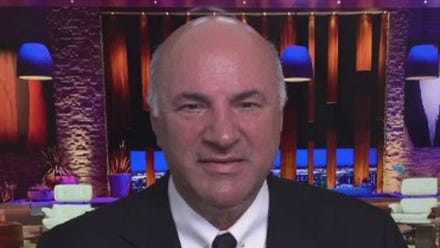
The Latest

Husband Sent Flirty Texts before Mica Miller’s Death, Waitress Says

Kristi Noem on Retraction: Kim Jong Un ‘Should Not be in the Book’

Kevin O’Leary: AI bossware can ID protesters and bar them from jobs

Neil A. Carousso Joins Growing NewsNation Network

Neil A. Carousso Departing WCBS 880

Art Business Founded by Former Foster Child Speaks to the Human Experience

1010 WINS Small Business $10K Challenge: Small Business Owners Make their Pitch for $10,000

NYC’s Élan Flowers Evolves into Blooming Subscription and Corporate Services

Creating an Authentic Retail Experience Online

WCBS Business Breakfast: Growth in the Hybrid Workplace
-
‘Influence starts with listening’: High-powered business coach on inspiring results
Post Views: 549By Joe Connolly and Neil A. Carousso
NEW YORK (WCBS 880) — The most successful business leaders inspire and motivate their employees to do their best work.
“The number one reason people will do things for you is because they like you,” said Alisa Cohn – a former startup CFO who blossomed into a startup and CEO coach, advising the leaders of major corporations such as Pfizer, Microsoft, Google and IBM.
Cohn writes, “Influence is the way you get others on board and sell your ideas.” On the WCBS Small Business Spotlight, sponsored by Dime Community Bank, she elaborated by telling Joe Connolly and Neil A. Carousso that “influence starts with listening” to employees’ perspectives and aspirations.
“When you listen to people and hear back what they say, that is the way people begin to start liking you, appreciating you, and that relatedness is going to help you sell ideas even if they’re a little bit controversial to the person that you’re talking to,” she explained.
This effort to understand diverse views will put workers in the best position to succeed and achieve corporate goals.
“You can’t just tell people what to do even if you’re the boss,” Cohn said, adding, “They don’t do what you want them to do just because you want them to do it, and if they did, they’re not really the best workers because you want people who are innovative, and creative, and resourceful. You don’t just want compliant order takers.”
The highly regarded business coach and guest lecturer at Harvard University and Cornell University allows it’s hard work to cultivate a team of entrepreneurial-minded employees, but that will foster sustainable growth.
“If you invented and are now building a startup around a new way of doing COVID testing that’s quick and easy, that’s fantastic but that may not be the market need over time,” Cohn said of sustainability in an unprecedented business climate. “You got to expand that to think overall about doing testing of other kinds of things so that people can get the information they need, because they don’t necessarily need to know forever if they have COVID, but they do need to understand important health information about themselves over time.”
Cohn told Connolly and Carousso the best way to grow a brand is to build a strong reputation and find opportunities to disseminate your ideas with potential customers and the business community.
“It’s very helpful to share your ideas on a blog, get published, and over time get published on more and more prestigious and high-end publications so your ideas have merit,” she said.
Links to publications where you and your business were quoted or featured on your website are effective marketing tools along with client testimonials. Cohn calls this “social proof” whereby those with whom you’ve done quality business are implicitly or explicitly endorsing your services.
Learn how to grow a sustainable business and empower your workers to deliver results on the Small Business Spotlight video above.
-
Small Business Spotlight: Pandemic Uncertainty Fuels Suburban Housing Shortage
Post Views: 581By Joe Connolly and Neil A. Carousso
WCBS 880 (NEW YORK) — The housing market has flipped upside down.
As people grow accustomed to new living habits, their housing needs have changed.
Alison Bernstein, founder of The Suburban Jungle Group, owns proprietary software that helps families develop a “home search strategy,” focusing on the neighborhood rather than the housing transaction.
“I think this whole pandemic and the way that we live and the way that we look at life has really shown that thinking about, objectively, all of your options is transforming the way you purchase real estate,” Bernstein said on the WCBS Small Business Spotlight, sponsored by Dime Community Bank.
She started the company in 2004 shortly after having her first child when she was considering moving out of the city to New York’s suburbs to raise her family.
In her home search, she realized there are three bedroom homes everywhere, but only one neighborhood that best suits each family.
“You want to understand, specifically, the community before you get into the home purchase,” said Bernstein.
Her employees are trained to be objective advisors to find the right community fit for each family depending on their lifestyle. For example, The Suburban Jungle Group would recommend a town on Long Island with Little League teams for a family with a young boy who’s interested in baseball. They partner with local agents to make the home purchase.
People are resetting their priorities and Bernstein believes they’re catching onto the flexibility of remote work, which has enabled The Suburban Jungle Group to grow, attract and retain talent, and expand nationally. They recently opened offices in Denver, Philadelphia and South Florida.
“The other piece of it is never having a written out business plan because I always explain to people that your business changes every day and I think where some of these businesses really got stuck when the world changed so quickly (is) they kept going back to this plan,” she said, adding, “You have to be quick and nimble.”
Bernstein told WCBS 880’s Joe Connolly and Neil A. Carousso the housing market is in a bit of a “holding pattern” right now because people are unsure if they will return to the office five days a week, work on a hybrid schedule or stay fully remote as the COVID-19 pandemic extends past a year.
“Right now, all across the board, specifically in the New York market, we’re facing an inventory issue outside of the city and a lot of that has really been driven by sort of the weirdness of the dynamic,” she explained. “This back to work is a big question. There are so many thoughts on what that’s going to look like and nobody really knows and that’s going to be a key determinant in terms of what’s happening in the market.”
The real estate veteran said there’s a lack of housing inventory in the suburbs nationwide, noting people used to live close to where they work, but commuting distance may be outdated for some workers in the post-pandemic economy.
“The home has been completely redefined,” Bernstein said. “Not only is it a place where you sleep, but now, you’re working, you’re schooling, you’re shopping, you’re eating, you’re exercising, so everything about the home is different. And so, now people’s take on home and where they want to be is also very different.”
See the new trends in the real estate market as people’s living habits and needs have changed on the WCBS Small Business Spotlight video above.
-
Small Business Spotlight: Brooklyn Entrepreneur Scales Property Maintenance Business to New Heights
Post Views: 701By Joe Connolly and Neil A. Carousso
NEW YORK (WCBS 880) — This entrepreneur is coming into his own.
Anthony Finkel grew up in Ditmas Park, Brooklyn where he developed an appointment-based snow removal service in 2013. He cleaned up, literally.
“That first snowfall, I got a bunch of phone calls. They called us again that next time, and when that first winter was up, they started asking us, ‘Hey, can you paint my porch, can you clean out my garage, can you fix my deck?'” he told Joe Connolly and Neil A. Carousso on the WCBS Small Business Spotlight, sponsored by Dime Community Bank.
Finkel met their needs and expanded his offerings at DPH Property Maintenance Service. When the pandemic hit, demand surged.
U.S. home improvement projects and repairs grew more than 3 percent last year to nearly $420 billion, according to a report from Harvard University’s Joint Center for Housing Studies.
Finkel reaped the benefits, telling WCBS 880 demand has remained high over the past year and it’s picking up this spring.
“They’re home, they’re not going to the office as much, and now, they’re converting that extra room that might have had clutter in it,” he explained. “Now, they want to clean it out, they want to re-paint it and they want to turn it into their home office or their studio space.”
People are investing in their homes and personal space while many companies look to implement hybrid work schedules when they can bring workers back to the office with COVID-19 safety measures in place. Some employees may never return to the office.
Finkel is renovating corporate spaces, too. He says it’s a “mixed bag” among his clients who plan to work from home long-term and those who will go back to their office.
He had six employees pre-pandemic and has hired four more to keep up with rising demand. He hopes to double the number of workers in the next 12 months if he can double subscriptions to his home and garbage clean-up service from 50 city dwellers to 100.
“When you understand the scope of the work that you’re doing and the quality, and you’re able to bring high quality, it makes it a little bit easier to stand by your pricing and stand by your ask because you know what you’re going to bring to the table, Finkel said. “When people hire DPH, they’re getting dependability, reliability, high quality service and no-nonsense.”
He told Connolly and Carousso customer service and quality has been the key for DPH Property Maintenance Service’s growth not volume, emphasizing research as the foundation of his home improvement work.
“It’s not about how fast, but it’s how precise,” Finkel explained. “You don’t want to have to go back and re-fix things that you thought were done before.”
See how this small business is scaling quickly and meeting demand on the WCBS Small Business Spotlight video above.
-
NJ Veterans Group Rebuilds Sandy-Destroyed Housing as Homelessness Crisis Worsens in Pandemic
Post Views: 642By Neil A. Carousso
NEW JERSEY (WCBS 880) — It’s been nearly a decade since Superstorm Sandy rocked the Tri-State, but a veterans organization is still trying to rebuild while the COVID-19 pandemic compounds the homelessness issue at the heart of its mission.
There are nearly 600 homeless veterans in New Jersey – a jump of 7.99 percent from 2019 to 2020, according to the U.S. Housing and Urban Development’s Annual Homelessness Assessment Report.
The American Legion Post 107 is hoping to reduce the number of homeless vets in Hudson County, estimated to be 70, by about a third next year when it anticipates phase II of its post-Sandy rebuild will be complete.
“Our objective is to take homeless veterans off the street,” said Post 107 Commander John Carey.
Phase I of rebuilding the Veterans Center of Hoboken took six veterans off the streets into fully-furnished apartments. Phase II will add 18 studios and six single-bedroom apartments to house 24 of our nation’s heroes. The organization hopes to break ground this summer for completion next year.
“Our apartments are furnished from everything from a toothbrush to a microwave oven,” said Carey who stressed this as the differentiating factor between the Veterans Center of Hoboken and other grassroots organizations that provide shelter for veterans – sometimes without even a mattress.
“These men, like myself, we served our country and for whatever reason they have a major problem right now, we need to service that problem,” said Carey who was drafted by the U.S. Army in 1965 and served two years in Thailand and Vietnam.
The Post Commander described his service as the “FedEx for Vietnam,” telling WCBS 880’s Neil A. Carousso, “We delivered everything from a bullet to a plane to Vietnam.”
Today, Carey is leading the non-profit effort to support his peers. It’s heartbreaking for him to walk by homeless vets on nearly every bench he passes along the Hudson River.
“The word homeless should never be used with the word veteran,” he emphasized.
The Veterans Center of Hoboken has provided meals, clothes and emotional support, virtually, during the pandemic.
“They’re out of the shelters because they can’t crowd in the shelters so they’re really all over the place,” Commander Carey explained. “We bring them food, clothing, we have a veterans closet where we bring them clothes.”
Carey told WCBS 880 he believes mental illness is at the root cause of the veterans homelessness issue and housing is a step for healing their wounds and providing dignity for those who bravely served the country.
“We will have an office there where we’re going to work with the VA. They’re going to have a counseling person there every day,” he said.
American Legion Post 107 has raised about $2 million from the community for the project.
They need roughly $3.75 million more to put Phase II over the finish line in the next 18 months. You can read more about the project and donate here.
-
Mr. Wonderful’s 3 Steps for Growing Your Business Again
In Best Of, Entertainment, Featured, Guest, Interview, Latest, News Stories, Technology, The World, videosPost Views: 701By Joe Connolly and Neil A. Carousso
NEW YORK (WCBS 880) — “Shark Tank” investor Kevin O’Leary stressed business owners need to adapt to what he believes are permanent changes to consumer behavior as a result of the COVID-19 pandemic.
On the WCBS Virtual Business Breakfast, presented by The First National Bank of Long Island, the self-made multi-millionaire entrepreneur made several recommendations of digital tools, sharing actionable advice for business recovery with host Joe Connolly. Mr. Wonderful also revealed what some of his companies have found success doing despite the economic turmoil.
1. MAKE THE “GREAT DIGITAL PIVOT”
.@kevinolearytv says 36/56 companies he had invested in have stayed in business because they embarked on the “great digital pivot.”
— WCBS 880 (@wcbs880) March 29, 2021
See Mr. Wonderful’s steps for growing your business again here: https://t.co/Z6pbg5WJqN#WCBSBizBreakfast #FNBLI @JoeConnollybiz @NeilACarousso pic.twitter.com/Xljxm2tAY0O’Leary divulged that only 36 of the 56 companies he had been invested in across “almost every sector” nationwide are still in business a year into the pandemic.
“They did the great digital pivot and that involves figuring out how to set up a platform – most of them use Shopify not Amazon, number one – to change their websites to be far more interesting and engaging,” he told Connolly.
Shopify allows businesses to create their own e-commerce website using the platform whereas Amazon is the consumer-facing website for companies’ online marketplace.
“They went to 4K photography, 1080p video, they told stories about their products, they had other customers talk about testimonials and how they were using them, so they really engaged people for the first time in ways they’ve never done before because they were forced to – everybody was working remotely,” O’Leary said.
He also shared the trick to monetizing digital content on the WCBS Virtual Business Breakfast. More on that later in Mr. Wonderful’s 3rd step to growing again.
2. PUT YOUR CUSTOMER FIRST
.@ABCSharkTank star @kevinolearytv tells @JoeConnollybiz the best way to sell is to promise customer support and deliver on it. #WCBSBizBreakfast #FNBLI
— WCBS 880 (@wcbs880) April 1, 2021
See Mr. Wonderful’s actionable steps for growing your business here: https://t.co/AtQ2BXZyH3 pic.twitter.com/x4BRNBPcr0O’Leary said the best way to sell is to “promise customer support and deliver on it.”
He told Connolly his frequent advice to young entrepreneurs is that the customer is always number one, and if you treat them like that, you can have a very profitable business.
“The differentiating factor in selling is customer service,” O’Leary said, adding, “You can actually sell the same product for a higher price if you’re in the top quartile of customer service for it.”
The software tycoon invoked Apple as a prime example.
“When you buy a laptop from them, you’re paying 50 percent more than the exact same machine’s function on a Windows-based product or a brand you may not know, but because Apple makes you pay for customer support and you respect it and you want it, you pay a crazy amount more,” he said.
3. REDUCE YOUR CUSTOMER ACQUISITION COSTS
.@NeilACarousso asked @kevinolearytv this question from WCBS 880 listeners. #WCBSBizBreakfast #FNBLI
— WCBS 880 (@wcbs880) April 3, 2021
See more tips for business growth from @ABCSharkTank’s Mr. Wonderful and @JoeConnollybiz here: https://t.co/SAFbziOdnM pic.twitter.com/w4wh9S5tYiWCBS Business Producer Neil A. Carousso posed the number one question WCBS 880 listeners had for O’Leary, which was “How do you monetize digital content?”
Mr. Wonderful responded the only metric for monetizing digital content is whether it can reduce customer acquisition costs for one’s product or service.
“Basically, what you’re trying to do when you make new digital content is to tell a story about your product, show it in its best light, try and get testimonials from other users who are using it and why they use it, and try and acquire customers at the lowest cost you can,” the Shark explained.
“Remember, long-term outcome is basically customer acquisition costs have to be less than lifetime value of the customer acquired. Otherwise, you go out of business,” O’Leary added.
He produces a plethora of content for the companies he’s invested in and shows behind-the-scenes of commercial shoots, media appearances, and his daily life on his YouTube channel, which includes afternoon bike rides along Miami Beach, playing the guitar, cooking in his “Chef Wonderful” videos and enjoying O’Leary Fine Wines with his wife Linda.
A bonus step for growing your business again, O’Leary acknowledges, is a healthy work-life balance.
“I don’t work 9 to 5, obviously, and I try and find life balance in doing the things I love to do while I’m working,” said Mr. Wonderful. “I work seven days a week, but I don’t work every hour.”
Social Feeds

VIDEO: Told the airline to book us on the next flight out (SPONTANEOUS TRIP!)

VIDEO: The Taylor Swift Effect | WCBS Business Breakfast

VIDEO: Future of NYC | WCBS Business Breakfast

VIDEO: Reasons for New Yorkers to be Optimistic | WCBS Business Breakfast

VIDEO: NYC's AI Chatbot | WCBS Business Breakfast






